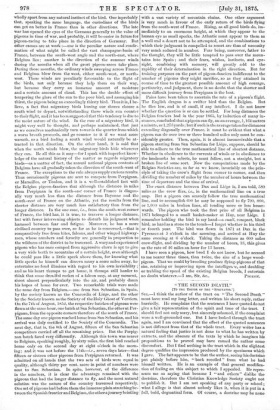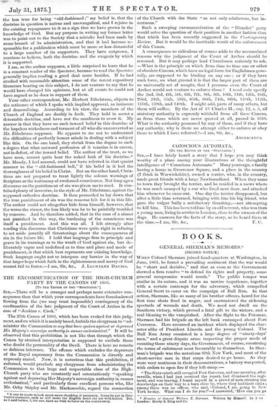" THE SECOND DEATH."
[TO THE EDITOR OF THE " SPECTATOR."]
SIR,—I think the author of the tract on " The Second Death " must have read my long letter, and written his short reply, rather hurriedly. He complains that the sentences I have quoted do not give a fair representation of the spirit and tone of the tract. I should feel not only sorry, but sincerely ashamed, if the complaint were a well-grounded one. But I have looked through the tract again, and I am convinced that the effect of the quoted sentences is not different from that of the whole tract. Every writer has a natural feeling that justice is not done to what he has written by extracts, and the absence of the texts by which he imagines his propositions to be proved may have caused the author some discomfort. But I find nothing in the tract which in the slightest degree qualifies the impression produced by the specimens which I gave. The fact appears to be that the author, seeing his doctrine put plainly before him, " back recoiled" from what he had himself written. He is an example of that general modifica- tion of feeling on this subject to which I appealed. He repro-. seats me as saying that because I " and others " dislike the doctrine, therefore the Christian Knowledge Society ought not to publish it. But I am not speaking of any party'or school ; what I allege is that almost nobody likes it, when it is put in a full, bold, dogmatical form. Of course, a doctrine may be none
the less true for being "old-fashioned ;" my belief is. that the doctrine in question is untrue and unevangelical, and I rejoice in the existing repugnance to it as a sign that we have grown in the knowledge of God. But my purpose in writing my former letter was to point out to the Society that a mistake had been made by some branch of its administration, and that it had become re- sponsible for a publication which must be more or less distasteful to a large number of its supporters. They have outgrown, I continue to believe, both the doctrine and the exegesis by which it is supported.
I am, as the author supposes, a little surprised to learn that he is a constant reader of the Spectator, because to read the Spectator generally implies reading a good deal more besides. If he had studied with reasonable attention some of the recent expository -literature bearing on this subject, I do not venture to say that he would have changed his opinions, but at all events he could not have argued as he does in support of them.
Your other correspondent, Mr. Herbert Ethelstane, objects to the reticence of which I spoke with implied approval, as insincere and demoralising. According to his view, the members of the Church of England are doubly in fault. They hold in secret a detestable doctrine, and have not the manliness to avow it. My answer is that they have no such inward belief in this doctrine of the hopeless wickedness and torment of all who die unconverted as Mr. Ethelstane supposes. He appears to me not to understand the difficulties of perfectly honest minds in dealing with a subject like this. On the one hand, they shrink from the dogma to such a degree that what outward profession of it remains is in excess, not in defect, of the inward belief. The author of the tract, as we have seen, cannot quite bear the naked look of his doctrine.* Mr. Moody, I feel assured, could not have referred in that quaint manner to the " old-fashioned hell," if his belief in it had the thoroughness of his belief in Christ. But on the other hand, Chris- tians are not prepared to treat lightly the solemn warnings of Scripture or the testimony of awakened consciences. Not long ago a discourse on the punishment of sin was given me to read. It con- tained plenty of invective, in the style of Mr. Ethelstane, against the supposed orthodox doctrine. It then proceeded to lay down that the true punishment of sin was the remorse felt for it in this life. The author could not altogether hide from himself, however, that the worse the sinner, the less likely was he to be painfully troubled by remorse. And he therefore added, that in the case of a sinner not punished in this way, the hardening of the conscience was itself a punishment. And this was all. I felt strongly after reading this discourse that Christians were quite right in refusing to set aside jauntily all threatenings about the consequences of sin in the future life. I hold that language firm in principle and grave in its warnings as to the wrath of God against sin, but de- liberately vague and undefined as to time and place and mode of punishment, is that which best represents our existing knowledge. Such language ought not to interpose any barrier in the way of that larger hope which faith in the righteousness and mercy of God cannot fail to foster.—I am, Sir, &c., J. LLEWELYN DAVIES.































 Previous page
Previous page